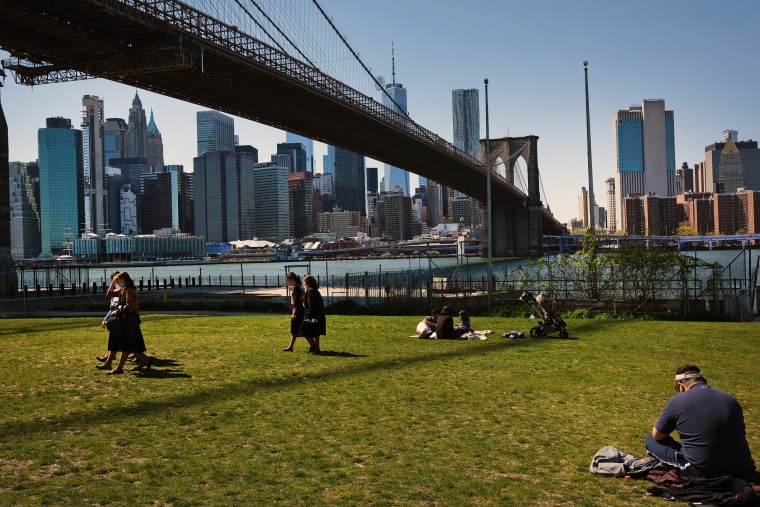Newly released statistics on the New York Police Department's social-distancing enforcement show that black people account for the majority of arrests in Brooklyn.
Police arrested 40 people in the borough for social-distancing violations from March 17 through May 4, the district attorney's office said Thursday night.
Of those arrested, 35 people were black, four were Hispanic and one was white.
More than a third of the arrests, 16, were made in Brownsville, a predominantly black neighborhood.
Five people were arrested in East New York's 75th Precinct and another five in Bedford-Stuyvesant's 79th Precinct.
No arrests were made in Park Slope, a majority-white neighborhood.
Brooklyn District Attorney Eric Gonzalez is the first prosecutor in the city to release statistics on social-distancing enforcement. In a statement Wednesday, Gonzalez said he was reviewing the social-distancing arrests to determine if criminal charges were warranted.
The NYPD on Friday afternoon released COVID-19 summons enforcement data from March 16 through May 5. Of the 374 summonses issued in regard to social distancing, 193 were given to black people and 111 to Hispanic people. "When the raw summons data is examined, black and Hispanic men and women are represented the most," the NYPD said.
The data is broken down by race, age and gender within each borough.
The data appears to confirm the suspicions of some community leaders, like the city's public advocate, Jumaane Williams, who, on Monday said that his office's requests for data on the demographics of who was being summonsed and arrested have gone unanswered.
Williams said "we had a feeling that there was not equity in enforcement."
Williams has said that the coronavirus pandemic is magnifying structural inequities in communities.
"It's not creating new ones," he said. "It's magnifying the ones that exist."
Williams raised concerns about unequal policing Sunday when he shared a handful of photos on Twitter. One image showed groups of white people sitting in a park, seemingly flouting social distancing rules, and three images appeared to depict encounters between police and people of color. One image was a still from a viral video that showed a police officer beating a black man in a confrontation that began over an attempt to enforce social distancing rules.
Brooklyn Borough President Eric Adams, a retired police captain, said that he has received 22 reports about "negative" social-distancing encounters between officers and civilians in the past week.
Adams has called on the city to be consistent in its messaging about and enforcement of social distancing rules.
"The events of the past week, and the widespread frustration felt by many communities of color right now, make clear that we need to get the police out of the business of social distancing enforcement," Adams said in a statement Friday. "This is a moment of re-culturing. Many people are not aware of social distancing guidelines, and issuing a summons or using harsh enforcement tactics can lead to major negative impacts."
Adams said he is concerned that if the city does not change course, "it could set back some of the gains we've seen in police-community relations."
After The New York Times published a report about the arrest statistics in Brooklyn, Mayor Bill de Blasio pledged to "do better."
"Saving lives in this pandemic is job one. The NYPD uses summonses and arrests to do it," the mayor tweeted. "Most people practice social distancing, with only hundreds of summonses issued over 6 weeks. But the disparity in the numbers does NOT reflect our values. We HAVE TO do better and we WILL."
At a news conference Friday, de Blasio said: "We do not accept disparity. When we see disparity, we're going to address it." He said that is a value he shares with Police Commissioner Dermot Shea.
De Blasio said that he saw the data for the first time Thursday night.
"The first thing that struck me was how few arrests there have been and how few summonses there have been," he said.
De Blasio said the 374 summonses issued by police officers in the past six weeks translates to fewer than 10 summonses a day.
He cautioned against drawing conclusions from the data and said that "there's been a huge amount of restraint by the NYPD."
"It's so small. I'm not belittling the experience that people go through at all but it's such a small number," he said, referring specifically to the data on arrests in Brooklyn. "Let's put it in perspective in a city of 8.6 million people in the middle of a pandemic."
De Blasio said the disparity will be addressed.
"But what we'll do about it is what we always do when we see a problem," he said. "We're going to go back, clarify the protocols. More training for officers. More work with supervisors to make sure that they are attentive to these issues.
"I want to see every community treated fairly," de Blasio said.

